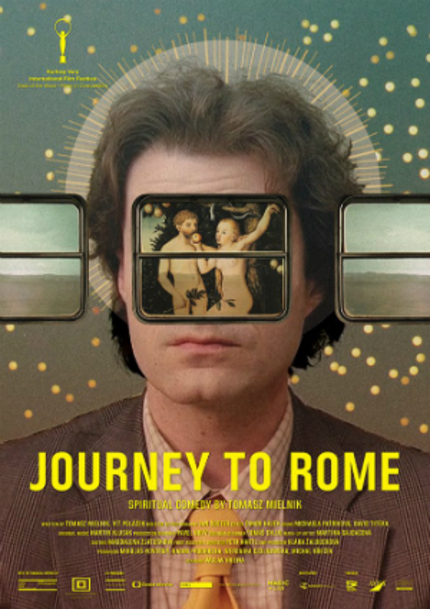Review: JOURNEY TO ROME, Imaginary Embroidery Reigns Over Spiritual Comedy

The credo, 'I am doing a big film so I want to have everything I like in there,' embraces the full potential of up-and-coming Polish filmmaker Tomasz Mielnik. He boasted a degree in art history under his belt while studying film direction at Prague´s film school FAMU, where he made an inconspicuously titled graduation film that doubled as his feature debut: Journey to Rome, a Czech-Polish coproduction.
The first shot of clinical symmetry opens a window into the world of imagery, foreshadowing the prominent spot for form that will eventually take over the substance, which is also a fairly big assumption, taking into consideration the director´s background. Mielnik confesses being inspired by frescoes of the 17th century Silesian painter Michael Leopold Willmann, most notably by the cycle of appearing and disappearing of lateral characters, a technique he not only devotedly emulates but builds the entire structure of his film upon.
Vašek (Václav Hrzina) lives a greyish of grey existence on the face of the Earth, carrying out his daily routine as a guardian in an art gallery, blankly staring on the world around him. Against all odds, fiery redhead (Berenika Kohoutová) ogles the insipid underachieving creature, cocooned in his own shell so deeply she has to approach him with the once-in-a-lifetime offer of her womb and a hand in prosperous wedlock. She consequently expresses concerns about his health and recommends a doctor, her father, to examine the husband-to-be for possible medical issues.
The dubious doctor diagnoses that he has a terminal illness. This is followed by a heartfelt eulogy of smoking. The fear for life sets in motion an odyssey of a naive yet harmless gallery guardian turning him into a smuggler, trying to cash a stolen painting in Rome, in good faith of receiving the obscure and alleged rare treatment for his equally mysterious diagnosis.
Whether it's an unsophisticated scam or just a clumsily orchestrated quest for dowry becomes irrelevant as the future bride will appear from now on only as a spectral siren in Vašek's delusions, the exposition fulfilling its only purpose of sending the protagonist on a mission equipped with two red herrings: the prospects of a wedding and the never-revealed stolen painting under his arm.
At this point, genre conventions of a (rail)road movie kick in, and the film starts fulfilling the director´s initial vision, morphing into a frescoesque carousel of fluctuating minor characters who the protagonist meets on his quirky pilgrimage. The spine of the main arc rapidly loses authority over the film, as it decays under a swarm of nested self-contained episodes, converting Journey to Rome into a colorful and droll tapestry. The cyclical formula of constant appearances and disapparances reigns over Mielnik´s oeuvre, as the film's pounding heart sets the pace in rhythmic dialectics of systole and diastole.
Journey to Rome tries to put forward a contemporary portrait in harmony with the basic line of existential musings, although Mielnik´s approach gravitates towards a tongue-in-cheek approach, spilling a bucket-full of irony all over the place. The reason why the film is dubbed as a "spiritual comedy" by the makers becomes apparent soon enough as the cohort of clergy mocked in surreally tinged spectacles brings into question whether the filmmaker was possessed by the spirit of Luis Bunuel while making the film.
Mielnik does not mock the faith but the institution after a heist parody narrative scoops prevalent spiritual concepts. The rotating characters and their fates encapsulate elementary Western and Eastern views on spirituality and philosophy of life. Mielnik and his screenwriting partner Vít Poláček attempt to conclude each one of the insertions with a punch line copying the the pattern of an overstretched sketch, surprisingly sparing them of a gutsier subversive or blasphemous take down, though one involves a monk finding a cathartic reverie in "serving" a flock of women. The bypassing of the profane and blasphemous for a less offensive approach reflects also the film's poetics.
Tomasz Mielnik succeeds in assimilating genre conventions, art-inspired stylistic choices, a winking, cinema-retromanic feel, and the loosely-knitted, 'station of a cross' kind of story into a polished mess. Unlike Showtime´s dark comedy series Happyish, the Polish filmmaker steps away from the caustic cynicism in favor of jolly irony and nonsense elevating his oeuvre more into the upbeat department.
More entertaining than actually enlightening, Journey to Rome´s strings of odd and colorful encounters and spiritual ruminations might acquire a minor following as not-so-radical yet visually charming effort falling between Jodorowsky´s The Holy Mountain and Ounpuu´s The Temptation of St. Tony. In the end, it´s a not-so-bad christening for Mielnik bearing a career promise in hope of future fulfillment, while also being amusing arthouse fare.
Journey to Rome is now in limited theatrical release in Czech Republic.
Journey to Rome
Director(s)
- Tomasz Mielnik
Writer(s)
- Tomasz Mielnik
- Vít Polácek
Cast
- Igor Bares
- Dana Batulková
- Ernesto Cekan
- Igor Chmela

Do you feel this content is inappropriate or infringes upon your rights? Click here to report it, or see our DMCA policy.






